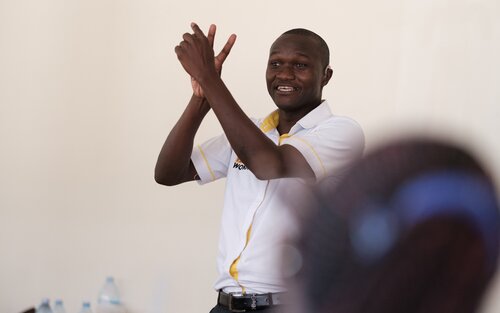Sign Language - Exploring the Culture and Challenges of Hearing Loss: Insights from Uganda
According to the Uganda National Disability Survey 2018, there are around 2 million people with hearing loss. This means that about 5.8% of the population of Uganda has hearing loss. Most people with hearing loss in Uganda are children, with about 1 million children affected. The causes of hearing loss in Uganda are varied, but the most common causes are congenital hearing loss, infections, and accidents. Many people are fascinated by how the hands dance when they see a group of individuals with hearing loss speaking with one another in public.

Disability vs culture
For many, this fascination with sign language is their reason for getting to know individuals with hearing loss better, and suddenly they discover that behind this secret mode of communication lies an entire culture.
From a medical point of view, people have hearing loss if they can only hear from 90 decibels or above; this is around the volume of a motor cycle driving past. For profound hearing loss, hearing assistance such as hearing aids or implants can only amplify speech to a limited extent.
Anything but dumb
Individuals with hearing loss don't like to see the term 'deaf-dumb', and it may even be perceived as an insult. Strictly speaking, someone is only dumb if their vocal organs are non-functional or absent, or if they are mute due to a previous psychological trauma (mutism). Therefore, individuals with loss of hearing are not 'dumb'.
Mute is equated with "speechless, having no language", but individuals with hearing loss are not speechless, thanks to sign language. The term 'deaf' alone may be used, however. Many are just not comfortable using spoken language, because they can't control their articulation and volume and this may sound strange those with hearing. In the past it was often seen as a cognitive impairment, for this reason.
Being hard of hearing is not the same as having hearing loss. Across those who are hard of hearing, there are additional classifications, which are generally defined by their severity: Mild to severe difficulty hearing, residual hearing, or deafness. For affiliation to the so-called Deaf-culture, the command of sign language is the defining feature, irrespective of hearing status.
A variety of Deaf associations
While many individuals who are hard of hearing or deaf generally only live in the 'world of hearing', so to say, most individuals with hearing loss prefer to remain among sign language users, due to the communication barriers. Because individuals with hearing loss usually don't see themselves as disabled, but instead as a member of this community or culture, there are barely any support groups available in the conventional sense, but rather a number of Deaf associations.
People with hearing loss in Uganda face several challenges, including difficulty communicating, accessing education, and participating in society. There are several organizations working to improve the lives of people with hearing loss in Uganda, but more needs to be done to raise awareness of hearing loss and to provide access to services.
